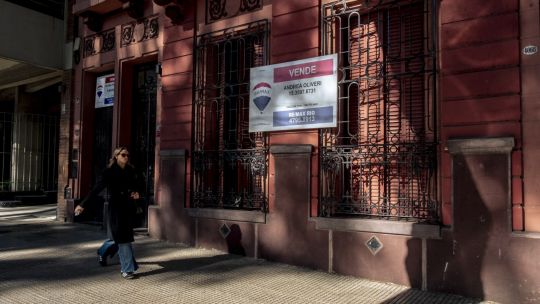
Executives from Banco Nación were preparing to head to Wall Street, ready to start making the pitch for a bond sale that would bankroll mortgages back home in Argentina.
It would have been a fairly unremarkable event for bankers in most other countries. But in Argentina – where residents have been forced to buy homes with stacks of cash after decades of runaway inflation, currency crashes and debt defaults upended the economy over and over – it was a sign of finally inching toward some sort of normalcy.
Then crisis flared again.
When President Javier Milei was handed a recent election defeat that threatens to derail his free-market agenda, investors fled en masse, resulting in a run on the currency so fierce that the Trump administration promised a US$20-billion lifeline to stabilise Argentina’s markets.
As interest rates jumped and credit dried up, the state-run Banco Nación scrapped its trip to New York, according to a person familiar with the matter. And other lenders nearly tripled mortgage rates to 15 percent over inflation, threatening to shutter a corner of the financial system that had only recently sprung back to life.
“These rates are a death blow to the mortgage market,” said Juan Manuel Truffa, an economist with local consultancy Outlier, before the US government announcements.
The recent market tumult was a stark reminder that despite signs of a turnaround since Milei took office less than two years ago, his success is far from assured. The libertarian leader’s brand of shock therapy has tamed runaway inflation – pulling it from the triple digits to around 34 percent as he slashed spending, fired government workers and lifted regulations on large segments of the economy. But his popularity has taken a hit, undermined by healthcare and education cutbacks and a brewing bribery scandal that extends into his inner circle.
After Milei’s party was handed a surprisingly large defeat in a local election in Buenos Aires Province earlier this month, global investors started yanking out cash, wagering his wobbly standing was poised to be further weakened by a more crucial nationwide midterm vote set for late October. The selling hammered stocks, bonds and the peso until the US Treasury Department stepped in, seeking to prevent a crisis from besieging an ideological ally in the runup to the election.
But even as the turmoil abated, the episode has cast a shadow over the economy by pushing up the cost of credit. Just ahead of the sell-off, the overnight bank lending rate jumped to around 80 percent and the cost of short-term corporate loans topped 100 percent. Since then, those costs have only pared some of the increase.
In the mortgage market, Banco Ciudad had already stopped making new loans altogether, according to people familiar with the pause. Other major lenders tightened credit standards and pushed up mortgage rates sharply.
‘Dizzying’
Florencia, a 33-year-old school psychologist, and her husband, in August were approved for a 30-year mortgage to help finance their purchase of a US$85,000 one-bedroom, one-bathroom home just south of Buenos Aires. Then, just before the election results roiled markets, their bank pulled back the offer — saying their credit score was no longer high enough to qualify.
“We were devastated. It was a life project for us, after so many previous failed attempts,” said Florencia, who asked that her last name be withheld for fear that any publicity could complicate her ability to secure a loan in the future. “I just hope this stabilises. Living like this is dizzying.”
Banco Nación, responsible for about half of Argentina’s home loans, is the only bank that hasn’t modified mortgage rates. But people familiar with the matter said it nearly doubled the credit score required for approval and it scuttled the planned trip to New York to promote potential bond sales that would allow it to step up its lending.
Daniel Tillard, president of Banco Nación, denied increasing credit requirements and wagered that any fall-out from earlier this month will be short lived. “We believe that the frictions are the result of an electoral period, both in mortgage credit and in the rest of rates,” he said. “It should tend to normalise.”
Loans and inflation
For now, though, the credit crunch is undermining what had been one of Milei’s early success stories.
When he took office, mortgage lending was virtually extinct in Argentina because its history of chronic political instability and heady inflation gave banks little incentive to extend long-term loans. Buyers had reason to avoid them, too, because the rates are tied to the pace of inflation – meaning a spike in consumer prices would send their monthly payments surging.
As a result, most homes instead were bought with piles of US dollars, the currency that Argentines have long preferred to use to safeguard their savings.
Once inflation started coming down, mortgage lending began to revive. In 2024, banks extended US$1.3 billion of such loans, up from just US$40 million in 2023, according to local consultancy firm Empiria. It had kept rising this year to total around US$2.5 billion by the end of August.
Yet even before this month’s market havoc, obstacles were already emerging. Milei’s moves to limit the supply of pesos – and thereby bolster the currency – had the side effect of tightening credit. And as the peso continued to slide, homes that are typically priced in US dollars got increasingly unaffordable.
“This was always bound to happen,” said Federico González Rouco, a senior economist at Empiria. “Obviously, the elevated risk complicates things. This will last a few months in the best-case scenario.”
Juan Pablo Rotger considers himself lucky. Late last year, he and his wife bought a US$200,000 two-bedroom, two-bathroom apartment just north of the capital thanks to a Santander mortgage featuring a 5.5 percent interest rate plus a variable one that tracks local inflation.
“We got in at just the right moment,” said Rotger, 29. “It’s a shame it was so short-lived.”
related news
by Manuela Tobias & Ignacio Olivera Doll, Bloomberg





